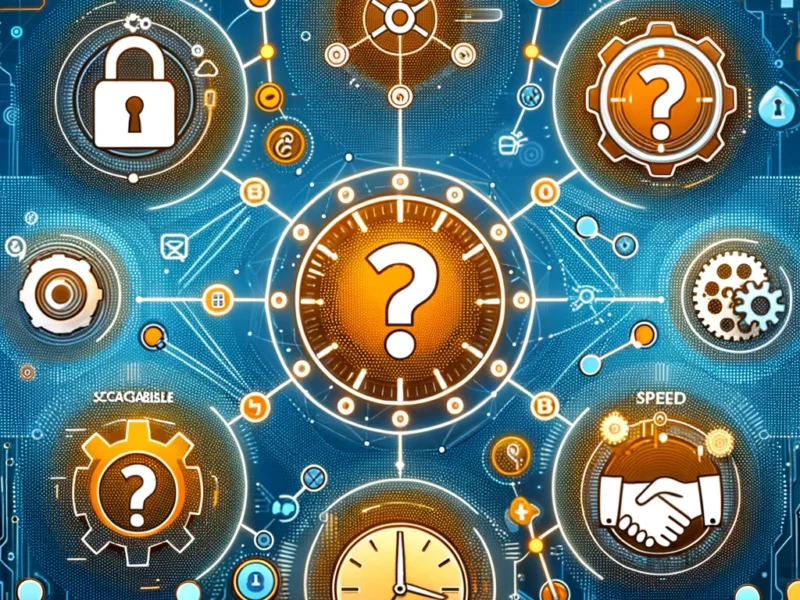Counterfeit pharmaceuticals are a major threat in the healthcare industry. These fraudulent medicines not only jeopardize the health and well-being of patients but also undermine trust in the pharmaceutical industry.
As the global supply chain becomes more complex, the challenge of combating counterfeits has become a pressing need. In this post, we will explore how blockchain can be used in combating counterfeit pharmaceuticals.
Jump To
ToggleThe Magnitude of the Counterfeit Pharmaceutical Problem
Counterfeit pharmaceuticals are a global epidemic, affecting both developed and developing nations. According to the World Health Organization (WHO), an estimated 1 in 10 medical products in low- and middle-income countries is either substandard or falsified. These fake medicines range from ineffective placebo pills to dangerous concoctions containing toxic substances.
The consequences of counterfeit pharmaceuticals can be severe. Patients who unknowingly consume these fraudulent medicines may experience treatment failure, adverse reactions, or even death. Also, the issue of counterfeits decreases public trust in the healthcare system and legitimate pharmaceutical companies, leading to reduced adherence to medical treatments and increased healthcare costs.
Traditional methods of combating counterfeits, such as enhanced packaging and enforcement efforts, have proven insufficient in the face of sophisticated counterfeiting operations. The complexity of the global pharmaceutical supply chain, with its numerous stakeholders and touchpoints, creates ample opportunities for counterfeiters to infiltrate the system.
How Blockchain Can Help in Combating Counterfeit Pharmaceuticals
Blockchain technology, best known as the foundation of cryptocurrencies like Bitcoin, offers a promising solution to the counterfeit pharmaceutical problem. A blockchain is a decentralized, immutable ledger that records transactions across a network of computers. This technology can be leveraged to create a secure, transparent, and tamper-proof system for tracking pharmaceuticals from manufacture to distribution.
1. Supply Chain Transparency
By recording each step of a pharmaceutical’s journey on a blockchain, from raw materials to final dispensation, stakeholders can have complete visibility into the supply chain. This transparency allows for the quick identification and isolation of any counterfeit products that enter the system.
2. Product Authentication
Blockchain technology can be used to create a unique digital identity for each legitimate pharmaceutical product. By assigning a digital token or certificate to each unit, manufacturers can enable end-users to verify the authenticity of their medicines using a simple smartphone app or web interface.
3. Immutable Record-Keeping
Once data is recorded on a blockchain, it cannot be altered or deleted without consensus from the network. This immutability ensures that the provenance and integrity of pharmaceutical products can be reliably tracked and verified, even in the face of attempts to manipulate the supply chain.
4. Smart Contracts for Automation
Smart contracts, self-executing agreements with terms directly written into code, can be used to automate various aspects of the pharmaceutical supply chain. For example, smart contracts can be programmed to automatically release payments to suppliers upon the successful delivery of authentic products, streamlining the process and reducing the risk of fraud.
5. Collaboration and Information Sharing
Blockchain networks can facilitate secure collaboration and information sharing among stakeholders in the pharmaceutical industry, including manufacturers, distributors, regulators, and healthcare providers. By creating a shared, decentralized database of pharmaceutical data, all parties can work together more effectively to combat counterfeits.
Real-World Applications and Case Studies
Several pharmaceutical companies and organizations are already exploring the use of blockchain technology to combat counterfeits and enhance supply chain integrity.
1. DHL and Accenture
Logistics giant DHL has partnered with Accenture to develop a blockchain-based pharmaceutical serialization system. The system tracks medicines from the point of manufacture to the point of sale, allowing for the easy identification of counterfeit products and enhancing overall supply chain transparency.
2. Mediledger
Mediledger is a blockchain-based platform developed by a consortium of major pharmaceutical companies, including Pfizer, Genentech, and McKesson. The platform aims to improve the efficiency, security, and transparency of the pharmaceutical supply chain by enabling the secure sharing of data among stakeholders.
3. Blockverify
Blockverify is a startup that uses blockchain technology to combat counterfeiting across various industries, including pharmaceuticals. The company’s solution involves assigning unique identities to products on a blockchain, allowing for the easy verification of authenticity by end-users.
4. FarmaTrust
FarmaTrust is a blockchain-based platform that focuses specifically on combating counterfeit pharmaceuticals. The platform uses a combination of blockchain, AI, and big data analytics to track and verify the authenticity of medicines throughout the supply chain.
Challenges and Considerations
While blockchain technology holds a huge potential for combating counterfeit pharmaceuticals, several challenges and considerations must be addressed for successful implementation.
1. Regulatory Compliance
The pharmaceutical industry is heavily regulated, and any blockchain solution must comply with existing laws and regulations related to data privacy, security, and drug safety. Collaboration with regulatory bodies is essential to ensure that blockchain implementations meet the necessary legal requirements.
2. Interoperability and Standardization
For blockchain to combat counterfeits effectively, there must be interoperability and standardization across different blockchain platforms and networks. The pharmaceutical industry will need to work together to develop common standards and protocols to enable seamless data sharing and collaboration.
3. User Adoption and Education
The success of blockchain in combating counterfeits relies on the adoption and participation of all stakeholders, including manufacturers, distributors, pharmacies, and patients. Educating users about the benefits of blockchain and providing user-friendly interfaces for interacting with the technology will be crucial for widespread adoption.
4. Scalability and Performance
As the pharmaceutical supply chain generates large amounts of data, blockchain solutions must be designed to handle high transaction volumes and ensure adequate performance. Scalability challenges must be addressed through efficient consensus mechanisms and off-chain data storage solutions.
The Future of Blockchain in Combating Counterfeits
In the future, blockchain-based solutions may become the standard for ensuring the integrity and authenticity of pharmaceutical products.
Patients will be empowered to verify the legitimacy of their medicines with a simple scan of a barcode or QR code, while regulators and law enforcement agencies will have access to a comprehensive, tamper-proof record of the supply chain.
Also, the use of blockchain in combating counterfeits may extend beyond pharmaceuticals to other industries plagued by fraudulent products, such as luxury goods, electronics, and food products.
The lessons learned from the pharmaceutical industry’s adoption of blockchain can serve as a blueprint for other sectors looking to enhance supply chain transparency and combat counterfeiting.
Key Takeaways
- Counterfeit pharmaceuticals significantly threaten public health, undermining trust in the healthcare system and legitimate pharmaceutical companies.
- Blockchain technology offers a promising solution to combat counterfeit pharmaceuticals by enabling supply chain transparency, product authentication, immutable record-keeping, and secure stakeholder collaboration.
- Real-world applications and case studies demonstrate the potential of blockchain in enhancing the integrity and efficiency of the pharmaceutical supply chain.
- Successful implementation of blockchain in the pharmaceutical industry requires addressing challenges related to regulatory compliance, interoperability, user adoption, and scalability.
- The future of blockchain in combating counterfeits looks promising, with the potential to extend beyond pharmaceuticals to other industries plagued by fraudulent products.
FAQs
1. What makes blockchain technology particularly well-suited for combating counterfeit pharmaceuticals?
A: Blockchain’s decentralized, immutable, and transparent nature makes it an ideal tool for tracking pharmaceuticals throughout the supply chain. By creating a tamper-proof record of a product’s journey from manufacture to distribution, blockchain enables the quick identification and isolation of counterfeit products, enhancing overall supply chain integrity.
2. How can patients and consumers benefit from the use of blockchain in combating counterfeit pharmaceuticals?
A: Patients and consumers can benefit from blockchain-based solutions by being empowered to verify the authenticity of their medicines. With the use of smartphone apps or web interfaces, patients can scan a barcode or QR code on a pharmaceutical product to check its legitimacy against the blockchain record, ensuring that they are receiving genuine, safe medications.
3. What role do smart contracts play in blockchain-based solutions for the pharmaceutical supply chain?
A: Smart contracts, self-executing agreements with terms directly written into code, can automate various aspects of the pharmaceutical supply chain. For example, smart contracts can be programmed to automatically release payments to suppliers upon the successful delivery of authentic products, streamlining processes and reducing the risk of fraud.
4. How can the pharmaceutical industry overcome the challenges of interoperability and standardization when implementing blockchain solutions?
A: To overcome interoperability and standardization challenges, the pharmaceutical industry must collaborate to develop common standards and protocols for blockchain implementation. This involves working with blockchain consortia, technology providers, and regulatory bodies to ensure that different blockchain platforms and networks can seamlessly communicate and share data.
5. What steps can be taken to ensure user adoption and education about blockchain in the pharmaceutical industry?
A: Encouraging user adoption and education requires a multi-faceted approach. Pharmaceutical companies and organizations can conduct training sessions, workshops, and webinars to educate stakeholders about the benefits and use of blockchain technology. Developing user-friendly interfaces and providing clear instructions for interacting with blockchain-based systems can also help lower the barriers to adoption.
6. How can blockchain solutions be designed to comply with regulatory requirements in the pharmaceutical industry?
A: Blockchain solutions must be developed in close collaboration with regulatory bodies to ensure compliance with existing laws and regulations related to data privacy, security, and drug safety. This may involve incorporating privacy-preserving techniques, such as zero-knowledge proofs, and ensuring that blockchain networks meet the necessary security and auditing requirements.
7. What are some potential future applications of blockchain technology in combating counterfeits beyond the pharmaceutical industry?
A: The use of blockchain in combating counterfeits has the potential to extend to other industries, such as luxury goods, electronics, and food products. By adapting the lessons learned from the pharmaceutical industry, these sectors can leverage blockchain to enhance supply chain transparency, product authentication, and consumer trust, ultimately reducing the prevalence of fraudulent products in the market.










